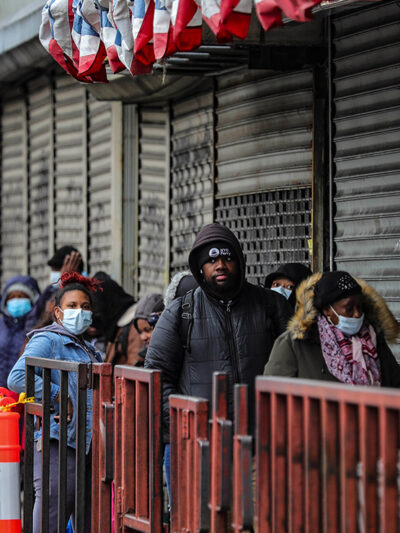News & Commentary
Apr 16, 2020
Law Enforcement Can Help Limit the Spread of COVID-19 + Toolkit for Community Action
Covid-19 is spreading in prisons and jails throughout the United States and South Carolina is not immune to this trend.People in prisons and jails are at heightened risk of contracting and dying from COVID-19. They are housed in close quarters, and are often in poor health and physically unable to follow the social distancing guidelines.South Carolina should be doing everything in its power to reduce the number of people currently incarcerated, and thankfully some counties are doing this.Yet, while some judges, solicitors, and law enforcement leaders in South Carolina have recognized the need to reduce the number of incarcerated people in their jurisdictions, Governor McMaster has issued a number of executive orders that could upend this progress.Many of the Executive Orders issued in response to the COVID-19 outbreak include provisions that expand police powers. These expanded powers lack clear definition and have raised serious concerns from vulnerable community members.While individual rights may give way to the greater good during a disease outbreak, the use of any measure that deprives individuals of their liberty must be scientifically supported and proportional. Some provisions of Governor McMaster’s Executive Orders fail to meet this basic test.Many of these provisions ask law enforcement officers to enforce criminal laws without clear guidance and/or proper training. For example:

Apr 08, 2020
If COVID-19 Doesn’t Discriminate, Then Why Are Black People Dying at Higher Rates?
ReNika Moore, Director, ACLU's Racial Justice Program
COVI

Apr 01, 2020
Probation and Parole Officers Should Do Their Part to Prevent the Spread of COVID-19 in South Carolina
According to a statement released by the National Association of Probation Executives and 50 current and former probation and parole executives from across the country, probation and parole agents should “do all [they] can in this crisis to make sure [they are] not inadvertently spreading the COVID-19 virus.”As the number of South Carolinians infected with COVID-19 continues to grow, it is imperative that the South Carolina Department of Probation, Parole and Pardon Services (DPPPS) do their part to prevent the spread of COVID-19 in the criminal justice system.We sent a letter today calling on DPPPS Director Jerry Adger to enact the following policies, also recommended by the Vera Institute of Justice:

Mar 28, 2020
SC Corrections Officials Must Respond to COVID-19 With Transparency
As the number of South Carolinians infected with COVID-19 continues to grow, we must focus on efforts to protect the health and well-being of all people housed and working inside South Carolina correctional facilities. An outbreak inside these institutions will be immensely difficult to contain and will compromise broader public health through transmission from employees who enter and exit the facilities on a daily basis.As of March 27, the South Carolina Department of Corrections (SCDC) has reported that one of its guards tested positive for the virus. Now more than ever, SCDC and other state corrections institutions must increase transparency and accountability to a response grounded in science and public health. Last week, the ACLU of Ohio asked Governor DeWine and the heads of Ohio’s state prison and youth systems to publicly answer several questions on a daily basis to ensure transparency and provide reassurance to the loved ones of corrections employees and incarcerated people. In less than twenty-four hours, the governor and state corrections agencies began posting the requested data and updating it daily. We are following our Ohio colleagues’ lead. Yesterday, we issued a request to SCDC, the South Carolina Department of Juvenile Justice, and Governor Henry McMaster to answer the following four questions daily on their public websites:

Mar 25, 2020
ACLU-SC Launches COVID-19 Email “Hotline” to Monitor Response in SC Prisons and Jails
Today we launched [email protected], an email hotline designated to receive information about violations inside South Carolina correctional facilities related to the COVID-19 pandemic. Anyone with information about abuses in South Carolina prisons, jails, and detention centers should email the hotline. So that we can respond effectively and efficiently, please include the following information in your message:

Mar 18, 2020
ACLU of South Carolina Demands the Release from Prisons and Jails of Communities Vulnerable to COVID-19
Today we submitted a letter to more than 400 South Carolina criminal justice officials recommending that they heed public health experts’ advice and immediately release individuals in detention who are at high risk of severe illness or death from COVID-19. Public health experts recognize that there is a heightened risk of infection for people who are involved in the criminal justice system. From policing, prosecution and pretrial hearings, to sentencing, confinement, and release, every aspect of the system must come under intense scrutiny for how it responds to this national public health crisis. In the letter, we asked system actors to respond to recommendations put forth by public health experts and specifically called for the immediate release from prisons and jails of communities identified by the Centers for Disease Control and Prevention (CDC) as vulnerable, as well as people currently in pretrial detention, to prevent a public health crisis.

Mar 10, 2020
COVID-19 Recommendations for Prison and Jail Officials
People involved in the criminal legal system face heightened risk of COVID-19 infection. We urge South Carolina prison and jail officials to immediately develop evidence-based and proactive plans for the prevention and management of COVID-19 in their facilities.

Mar 07, 2020
South Carolina Must Stop Shackling Pregnant People Who Are Incarcerated
Last week, South Carolina Senators voted unanimously to advance legislation seeking to limit the types of restraints used on pregnant people who are incarcerated and virtually abolish the practice of shackling people during labor, childbirth, and postpartum recovery. The legislation will return to the House of Representatives with a new amendment which would further expand protections for pregnant incarcerated people.If passed as amended, South Carolina’s prisons, jails, and work camps would be required to provide access to adequate nutrition and a bottom bunk and would be prohibited from holding pregnant incarcerated people in solitary confinement under most circumstances. The amendment also requires prisons, jails, and work camps to ensure the availability of menstrual hygiene products for all people under their care with an active menstrual cycle and mandates that these products be made available at no cost to those who cannot afford to pay. Additionally, the Department of Corrections would be required to authorize weekly contact visits between incarcerated people with low or minimum-security classifications and their children.The practice of shackling incarcerated people while they are pregnant, in labor, giving birth, and recovering from birth has been opposed by the nation’s leading experts in maternal, fetal, and child healthcare, including the American Congress of Obstetricians and Gynecologists (ACOG), the American Medical Association, and the American Public Health Association. Additionally, the Federal Bureau of Prisons, U.S. Immigration and Customs Enforcement and the American Correctional Association have all adopted policies to limit the use of shackles on pregnant people who are incarcerated. Across South Carolina, criminal justice and reproductive health advocates have come together to support this legislation. The organizations include the ACLU of South Carolina; ANSWER Coalition; the Association of Women’s Health, Obstetric, and Neonatal Nurses (AWHONN); the South Carolina Perinatal Association; Justice Carolina; and the Women’s Rights and Empowerment Network.We are thrilled to be one step closer to ending the cruel and inhumane practice of shackling incarcerated people during labor, childbirth, and postpartum recovery and we urge the South Carolina House of Representatives to pass this legislation as amended and greatly increase the likelihood of positive outcomes for parents and their newborn children.

Mar 06, 2020
South Carolina’s Coronavirus Response Plan Must Protect the Health, Safety, and Civil Liberties of All
Last Monday a group of over 800 public health experts and organizations signed a public letter warning that widespread transmission of COVID-19 within the United States is “inevitable.” This letter includes recommendations to federal, state, and local leaders on achieving a fair and effective response to the coronavirus outbreak.We urge South Carolina leaders to follow these recommendations.People in prisons and jails are highly vulnerable to outbreaks of contagious illnesses. They are housed in close quarters and are often in poor health. Without the active engagement of the prison administration, they have little ability to inform themselves about preventive measures or to take such measures if they do manage to learn of them. We are particularly concerned because incarcerated individuals have historically faced harm during emergencies in South Carolina. For example, South Carolina has failed to evacuate incarcerated people from its prisons during mandatory hurricane evacuations.All South Carolinians are at greater risk when people are unable to afford testing and treatment. Diseases like COVID-19 do not distinguish between people with comprehensive health insurance policies and those without. To limit the transmission of the virus, responses to COVID-19 must ensure that all people have access to testing and treatment.COVID-19 does not care who is undocumented. Health care facilities must be declared “immigration enforcement-free zones” --- and that declaration must be well-publicized. South Carolina’s response must dismantle all barriers to testing and treatment, including the fear within immigrant communities that an individual could be picked up by ICE if they seek medical help.South Carolina must support people who cannot afford to miss work or lack paid sick leave. All South Carolinians face increased risk if people hide their condition and go to work because they cannot afford to miss a paycheck. The government must work with employers to ensure that workers are supported in voluntarily staying home when sick, even if they’re not sick enough to go to the hospital.Information regarding COVID-19 must be transparent and timely. Political leaders will be more likely to maintain public trust and cooperation if their public statements are accurate and based in science.Finally, voluntary isolation measures are more effective than coercive measures. While the use of a mandatory quarantine may be justified if it is scientifically supported and proportional, people are more likely to cooperate with voluntary isolation measures.It is essential that all government officials follow these experts’ recommendations to help ensure a response plan that protects the health, safety, and civil liberties of all.

Stay Informed
Sign up to be the first to hear about how to take action.
By completing this form, I agree to receive occasional emails per the terms of the ACLU’s privacy statement.
By completing this form, I agree to receive occasional emails per the terms of the ACLU’s privacy statement.
